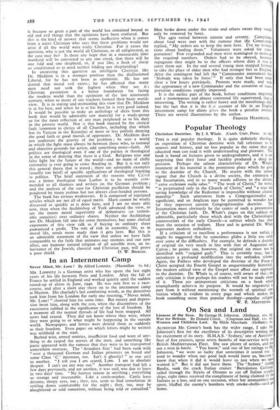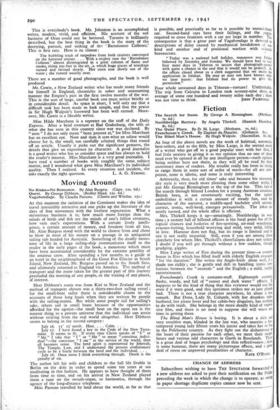On Sea and Land
Lioness of the Seas. By George H. Johnston. (Gollancz. res. 6d.' War for Britain. By Donald Cowie. (Chapman and Hall. 12s. 6d: Women and Children Last. By Hilde Merchant. (Gollancz. 6s. ALTHOUGH Mr. Cowie's book has the wider range, I take Mr. Johnston's first for the excellence of its descriptive writing and the excitement of its story. H.M.A.S. Sydney,' one of Australia's fleet of five cruisers, spent seven months of war-service with the British Mediterranean Fleet. She saw plenty of action, and lost not a man in battle. "You know," said one of her ratings to Mr Johnston, " we were so lucky that sometimes it scared me. I used to wonder when our good luck would leave us, because I knew that when it did it would leave us just when we most wanted it." But it did not leave them. The ' Sydney' shelled, Bardia, sank the crack Italian cruiser Bartolomeo Colleow, sailed through the Straits of Otranto to cut off Italian supply- ships, eight times received the compliment of being claimed by the Italians as a loss, and on one occasion, when her ammunition wa . spent, bluffed the enemy's bombers with smoke-shells—and g°1 home.
This is everybody's book. Mr. Johnston is an accomplished writer, modest, vivid, and efficient. His account of the sad business of Oran could not be bettered. Taranto is brilliantly described, but the best thing in the book is the story of the decoying, pursuit, and sinking of the ' Bartolomeo Colleoni.' This is first rate. Here is its climax : The bubbling track of torpedoes from both cruisers converged on the battered cruiser. . . . With a mighty roar the ' Bartolomeo Colleoni' almost disintegrated in a great column of flame and smoke, rising 30o feet in the air, which huge pieces of wreckage turned and twisted slowly. Her stern rose slowly out of the water ; she turned wearily over.
There are a number of good photographs, and the book is well produced Mr. Cowie, a New Zealand writer who has made many friends for himself in England, chronicles in sober and unassuming manner the Empire's part in the first twelve months of the war. This is the sort of large, careful book one must notice briefly or in considerable detail. As space is short, I will only say that a difficult task has been made to look simple, and that the praise in Sir Hugh Walpole's foreword has been well earned. More- over, Mr. Cowie is a likeable writer.
Miss Hilde Marchant is a reporter on the staff of the Daily Express. After a brief overture at Bad Godesburg, she tells us what she has seen in this country since war was declared. By " seen " I do not only mean " been present at," for Miss Marchant has an excellent eye. Now and then it sees what an editor would choose for it, the small, too carefully selected things that round off an article. Usually it picks out the significant gestures, the details that give an experience its character. A good journalist is a good writer who has to consider space and has always to hold the reader's interest. Miss Marchant is a very good journalist. I have read a number of books with roughly the same, subject matter, and I wondered what gave Miss Marchant's its individual quality. Then I realised. In every situation and incident, she



























 Previous page
Previous page